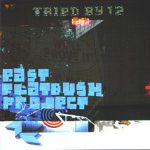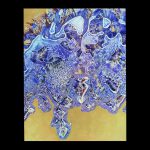Third of 4 records published by Sub Rosa from 1996 to 2000.
Sean Cooper, All Music Guide
The least groundbreaking of Bisk’s albums to date, Ticklish Matters is still pretty weird. The title might refer to the preponderance of piano samples, or even to the fits of giggling Bisk’s bizarre juxtapositions might inspire. Either way, Ticklish Matters contains the same complex, scissored-to-ribbons sample orchestrations of his past work, though it backs a bit off of the almost formless texture-clustering of Strange or Funny-Haha? and leaves behind much of the dance music references of Time. It’s probably the most “listenable” Bisk record to date, but it’s also the least enthralling.
Various other reviews
Three albums in and still nothing is known of Bisk beyond a name (Naohiro Fujikawa), an age (24 — can it be?), and a location (Hyogo, Japan). Strange, given the music contained on those three albums — Time (1996), Strange or Funny-haha? (1997), and this his latest, Ticklish Matters — so consistently begins so very many leagues beyond the typical as to almost demand some sort of first-hand explanation. (Uh, excuse me — Mr. Fujikawa?) While the diversity of current electronica is at least generalizable as such, Bisk tends to escape the file-folder of eclecticism quite simply because so little music being made today sounds quite so bizarre as his. Fujikawa’s mad-scientist test-tubes bear the bastard blur of, at random, Holger Hiller, Frank Zappa, Atom Heart, and David Shea even as they escape such a patchwork description (it’s all too clean for Hiller, too rootless for Atom Heart, etc.). And like the ’80s experiments of countrymen Haruomi Hosono and Ryuichi Sakamoto, Fujikawa’s music cracks the lid on the machines, taking a compositional guess at how all these chips and wires and processors and things might just allow one to make music that literally cannot be imagined.
Ticklish Matters. Are these the same quirks of hearing that put the chuckle in Strange or Funny-haha? Maybe it’s the abundance of piano; Matters seems to employ the “tickling of the ivories” as a way of grounding the flows of sonic choas the tracks slowly pour their way out of. This is probably the most “acoustical” Bisk record yet; where samples of pianos, guitars, drums, horns, and other such means of traditional music making have in the past played a more genetic role, here they’re subject to much less mutilation, assembled into a weirdness born of sequence and process, not processed sequencing. The effects is closer to Strange than to Time, but it’s also a new direction of sorts — cleaner, more methodical. Already-fans will be taken by Ticklish Matters’ mid-section; “Break In the Clouds,” “Massive Flow,” and “Whistle for Drumming” are built from similar scraps as was much of his previous album (and tracks like “Vague Recollection,” one of three contributions to Sub Rosa’s Water & Architecture compilation). At the other end of expectation are tracks like “Flicker” and the mesmerizing “Walz,” a disheveled dance tune for drunken cartoon balls, the “one-two-three” of starched collars and stepped-on toes the rare familiar resting place between a roil of samples churned and shuffled like a deck of no-longer-decipherable playing cards. Not quite Strange’s better, then, but that still leaves a lot of room, and Ticklish Matters does a good job filling it.



